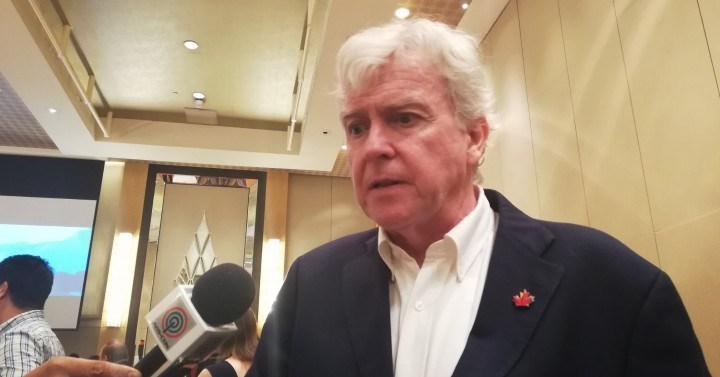Headline
PH-Canada relations ‘good’, back to normal: envoy

PH-CANADA RELATIONS BACK TO NORMAL. Canadian Ambassador John Holmes on the sidelines of the 152nd Canada Day reception hosted by the CanCham of the Philippines at Fairmont Makati on Monday (July 1, 2019) night. He said Philippines-Canada relations are “good and are only going to get better”. (PNA photo by Joyce Ann L. Rocamora)
MANILA — The Philippines-Canada bilateral relations are back to normal and are seen to “get better” following the resolution of the two nations’ waste issue, Canadian Ambassador John Holmes said during the 152nd Canada Day in Makati City on Monday night.
“The final resolution of this problem, never mind how long it took, came about through tremendous cooperation between the government of the Philippines, the Embassy, and the officials in Canada,” he said in a speech at a reception hosted by the Canadian Chamber of Commerce of the Philippines.
“We got the job done and my message coming out of that issue is that if our two countries can continue to work collaboratively as we did in resolving this matter, imagine what we can do to enhance our trade, our investment, our people-to-people context. The opportunities are limitless and we really want to build on that,” he added.
Holmes said the Canadian government is “delighted” with Malacañang’s statement affirming that Ottawa and Manila’s relations are “cordial” and back to normal.
“Our relations are good and are only going to get better,” he added.
The Philippines and Canada are seeking to boost ties in the areas of agriculture, transportation, and information and communications technology.
“These are the areas we are very interested and I think a lot of scope for partnerships in that,” Holmes said.
Asked if Canada would pursue parties accountable to the garbage issue, the diplomat said it is a subject for the Philippines’ court.
“(DFA) Secretary Locsin said, I think publicly and tweeting, he said that’s the plan. I think that was one of the challenges that we had, there were court cases and court orders that we had to figure out how to work through and respect. One of them is the legal responsibility, that’s not a Canadian issue,” he said.
“(The) Canadian company at the time exported legally, so there are no legal issues in Canada,” he added.
From 2013 to 2014, Canadian company Chronic Inc. exported containers labeled as recyclable plastics to two importers in the Philippines. The shipment contained a mixture of plastics, metals, and paper, as well as household waste.
While the export of such material was allowed under Canadian regulations at the time, the import of mixed plastics and household waste is prohibited under Philippines regulations.
In 2016, courts in the Philippines ordered the importers to ship the containers back to Canada at their expense; the importers did not comply with the court order.
To prevent future exports of such material, Canada amended its Export and Import of Hazardous Waste and Hazardous Recyclable Material Regulations in 2016.
According to Environment and Climate Change Canada, the amendments now apply to waste that is controlled or prohibited in the country of import, consequently, the shipment sent to the Philippines in 2013 and 2014 would be prohibited today.
‘Extremely effective’
The envoy, for his part, cited the assistance extended by officials of the Philippine government including those of the Department of Environment and Natural Resources and the “very colorful” Foreign Affairs Secretary Teodoro Locsin Jr. who made sure that everything went smoothly.
“When we got the different deadlines, the second one was more realistic because it was linked to the departure of one of the regular ships going through. We had a number of little issues emerged and I was in constant contact with (Secretary Locsin), texting, phoning. He was in Japan, I was actually in Canada, but we were in regular contact,” he shared.
“There was one issue, although not really controversial, as you know we had to fumigate the containers. So we had set up the contract, the guys were working and then we were notified that the base is going to be closed all weekend for the joint Filipino-American military training. I phoned the Secretary so he said ‘I’m on it. I’m on it.’ Our fumigation team was back on the job that Saturday afternoon,” he said.
“There were a number of other issues, I don’t want to give you the details, but he was very helpful. My minister phoned him a couple of times to thank him for his help,” he said.





















